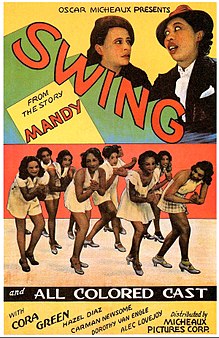Oscar Micheaux
 |
| Oscar Micheaux |
Micheaux's life experiences served as the subject matter for his novel, The Homesteader, which is largely regarded as the most famous of his books. In 1919, he produced a film of the novel. The movie is the first feature-length film made for a black audience. These types of films were known as "race films", from 1915-1950's these films included all-black casts and were intended to be viewed by an all-black audience. A sometimes controversial character, Micheaux continued to make films for the next three decades until his death on March 25, 1951, in Charlotte, North Carolina.
 Micheaux's second film, 1920s Within Our Gates, was his response to D.W. Griffith's Birth of a Nation, one of the most popular movies at the time that portrayed the racial hatred group the Ku Klux Klan in a positive way. Within Our Gates attempted to challenge the Birth of a Nation's message by showing more realistic examples of white supremacy. In the movie, a biracial teacher Sylvia Landry goes up North to raise funds the school she worked at attended by African-American children. Within Our Gates was included very disturbing themes, showcasing the lynching of innocent blacks, the near rape of the main character Sylvia, and a dutiful preacher who secretly feels despair that he's selling out his own race.
Micheaux's second film, 1920s Within Our Gates, was his response to D.W. Griffith's Birth of a Nation, one of the most popular movies at the time that portrayed the racial hatred group the Ku Klux Klan in a positive way. Within Our Gates attempted to challenge the Birth of a Nation's message by showing more realistic examples of white supremacy. In the movie, a biracial teacher Sylvia Landry goes up North to raise funds the school she worked at attended by African-American children. Within Our Gates was included very disturbing themes, showcasing the lynching of innocent blacks, the near rape of the main character Sylvia, and a dutiful preacher who secretly feels despair that he's selling out his own race.Micheaux's films were made during a time where there was a great change occurring in the African-American community. His films featured contemporary black life and discussed racial relationships between blacks and whites, and the challenges for blacks when trying to achieve success in a predominantly white society. His films were used to oppose and discuss the racial injustice that African Americans received. Topics such as lynching, job discrimination, rape, mob violence, and economic exploitation were shown in his films. These films also reflected his ideologies and personal experiences.
Micheaux sought to create films that would counter the white portrayals of African Americans, which tended to emphasize inferior stereotypes. He created complex characters of different classes. His films questioned the value system of both African American and white communities as well as caused problems with the press and state censors.
This is such an interesting post! Oscar Micheaux is an inspiring example of someone who did everything he could to make a change in the racist culture with the little opportunity he had to do so, as an African American in the early twentieth century. While African Americans lacked many rights, Micheaux used his right to freedom of speech and expression in a way that would help other people who faced similar struggles by providing narratives with which they could actually associate, unlike the false narratives like Birth of a Nation that were popular among white Americans. We have learned of many examples of people and groups throughout history who have used freedom of speech to spread dangerous ideas; Micheaux is an example of someone who tried to use the same right to make a positive change in his community.
ReplyDeleteI think Oscar Micheaux, as described in the post is a very interesting and influential character. His film “Within Our Gates” was the first film that was created by an African American to be shown in a “white” movie theater. As Brynna brought up, this shows how he used his freedoms in a positive manner and in a progressive manner. I think these films also showed his success in making a difference. He was able to get through to other people and people of the “white” race. I think this also showed a slight shift in “white” people’s attitude due to the fact that they allowed this film to be shown in their movie theaters I believe that this showed progression in the attitude toward African Americans.
ReplyDeleteBy no means am I saying they were equal, but this was an obvious effort and change in society when this controversial film depicting the actual horrors that were being committed against African Americans was allowed to play in an all-white movie theater.